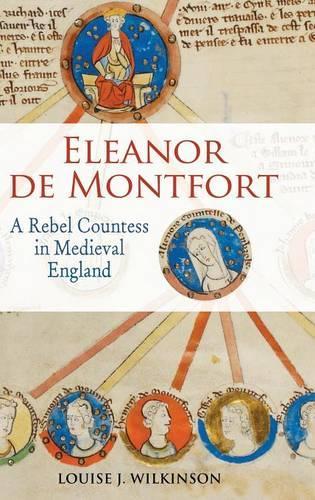
Eleanor de Montfort: A Rebel Countess in Medieval England
(Hardback)
Publishing Details
Eleanor de Montfort: A Rebel Countess in Medieval England
By (Author) Dr Louise J. Wilkinson
Bloomsbury Publishing PLC
Continuum International Publishing Group Ltd.
8th March 2012
United Kingdom
Classifications
Professional and Scholarly
Non Fiction
European history: medieval period, middle ages
942.034092
Physical Properties
Hardback
232
Width 156mm, Height 234mm
532g
Description
As sister of Henry III and aunt of the future Edward I, Eleanor de Montfort was at the heart of the bloody conflict between the Crown and the English barons. At Lewes in 1264 Simon de Montfort captured the king and secured control of royal government. A woman of fiery nature, Eleanor worked tirelesslyto supporther husband's cause. She assumed responsibility for the care of the royal prisoners and she regularly dispatched luxurious gifts to Henry III and the Lord Edward. But the family's political fortunes were shattered at the battle of Evesham in August 1265 where Simon de Montfort was killed. The newly-widowed Eleanor rose to her role as matriarch of her family, sending her surviving sons - and the family treasure - overseas to France, negotiating the surrender of Dover Castle and securing her own safe departure from the realm. The last ten years of her life were spent in the Dominican convent at Montargis.
Drawing on chronicles, letters and public records this book reconstructs the narrative of Eleanor's remarkable life.
Reviews
While the book achieves its goal of providing a biography of a previously neglected noblewoman, it also, intentionally or not, inspires much more, motivating scholars to analyze womens status as sisters, in addition to their positions as wives, widows, or mothers, to glean more information about the bases of womens political action . . . This modest biography of a single English princess opens the door to future examinations of the status and power of royal sisters. -- Katrin E. Sjursen, Southern Illinois University Edwardsville * Medieval Feminist Forum *
this book is an important contribution to current scholarship. It clearly demonstrates that medieval aristocratic women were not the meek shadows of their husbands that they were once assumed to be. Eleanor was lively, impassioned, politically astute, and economically powerful. She was able to balance familial, political, and personal matters in a period of history when England was in upheaval. Eleanors life and connections span both sides of the de Montfort rebellion, both chronologically and politically. This book will open the way for scholarly discussion of the life of this fascinating woman. -- Catherine Innes-Parker, University of Prince Edward Island * The Historian *
Author Bio
Louise Wilkinson gained her doctorate at Kings College London and now teaches at Canterbury Christ Church University.
